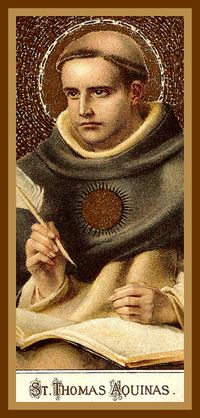St. Thomas Aquinas
Saint Thomas Aquinas, O.P., also Thomas of Aquin or Aquino; (Aquino, 1225 – Fossanova, 7 March 1274) was an Italian priest of the Catholic Church in the Dominican Order, and an immensely influential philosopher and theologian in the tradition of scholasticism, known as Doctor Angelicus (the Angelic Doctor) and Doctor Communis or Doctor Universalis (the Common or Universal Doctor). He is frequently referred to as Thomas because "Aquinas" refers to his residence rather than his surname. He was the foremost classical proponent of natural theology, and the father of the Thomistic school of philosophy and theology. His influence on Western thought is considerable, and much of modern philosophy was conceived as a reaction against, or as an agreement with his ideas, particularly in the areas of ethics, natural law and political theory.
Thomas is held in the Catholic Church to be the model teacher for those studying for the priesthood. The works for which he is best-known are the Summa Theologica and the Summa Contra Gentiles. One of the 33 Doctors of the Church, he is considered the Church's greatest theologian and philosopher. Pope Benedict XV declared: "The Church has declared Thomas' doctrines to be her own."
On the Nature of God, Sin and the Trinity
God is simple, without composition of parts, such as body and soul, or matter and form. God is perfect, lacking nothing. That is, God is distinguished from other beings on account of God's complete actuality. Thomas defined God as the 'Ipse Actus Essendi subsistens,' subsisting act of being.
On the Nature of God
Concerning the nature of God, Thomas felt the best approach, commonly called the via negativa, is to consider what God is not. This led him to propose five statements about the divine qualities:
- God is simple, without composition of parts, such as body and soul, or matter and form.[127]
- God is perfect, lacking nothing. That is, God is distinguished from other beings on account of God's complete actuality. Thomas defined God as the 'Ipse Actus Essendi subsistens,' subsisting act of being.
- God is infinite. That is, God is not finite in the ways that created beings are physically, intellectually, and emotionally limited. This infinity is to be distinguished from infinity of size and infinity of number.
- God is immutable, incapable of change on the levels of God's essence and character.
- God is one, without diversification within God's self. The unity of God is such that God's essence is the same as God's existence. In Thomas's words, "in itself the proposition 'God exists' is necessarily true, for in it subject and predicate are the same."
On the Nature of Sin
Following St. Augustine of Hippo, Thomas defines sin as "a word, deed, or desire, contrary to the eternal law." It is important to note the analogous nature of law in Thomas's legal philosophy.
Natural law is an instance or instantiation of eternal law. Because natural law is what human beings determine according to their own nature (as rational beings), disobeying reason is disobeying natural law and eternal law. Thus eternal law is logically prior to reception of either "natural law" (that determined by reason) or "divine law" (that found in the Old and New Testaments).
In other words, God's will extends to both reason and revelation. Sin is abrogating either one's own reason, on the one hand, or revelation on the other, and is synonymous with "evil" (privation of good, or privatio boni). Thomas, like all Scholastics, generally argued that the findings of reason and data of revelation cannot conflict, so both are a guide to God's will for human beings.
Nature of the Trinity
Thomas argued that God, while perfectly united, also is perfectly described by Three Interrelated Persons. These three persons (Father, Son, and Holy Spirit) are constituted by their relations within the essence of God. Thomas wrote that the term "Trinity" "does not mean the relations themselves of the Persons, but rather the number of persons related to each other; and hence it is that the word in itself does not express regard to another." The Father generates the Son (or the Word) by the relation of self-awareness. This eternal generation then produces an eternal Spirit "who enjoys the divine nature as the Love of God, the Love of the Father for the Word."
This Trinity exists independently from the world. It transcends the created world, but the Trinity also decided to give grace to human beings. This takes place through the Incarnation of the Word in the person of Jesus Christ and through the indwelling of the Holy Spirit within those who have experienced salvation by God; according to Aidan Nichols.
- More information is available at [ Wikipedia:St._Thomas_Aquinas ]
Chat rooms • What links here • Copyright info • Contact information • Category:Root
